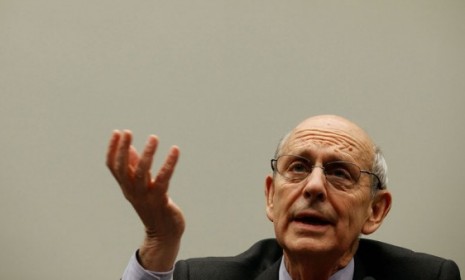Is burning the Koran free speech?
Justice Stephen Breyer says torching the Muslim holy book might not be a protected freedom — and critics find him in contempt

A free daily email with the biggest news stories of the day – and the best features from TheWeek.com
You are now subscribed
Your newsletter sign-up was successful
Last week, a Florida pastor backed down from a plan to burn Korans on Sept. 11 to protest Islamist terrorism — but not before the news provoked deadly riots in Afghanistan. Now a new debate has erupted after Supreme Court Justice Stephen Breyer told ABC News that Americans may not have a constitutionally protected right to torch Muslim holy books. The right to speak your mind, Breyer said, "doesn’t mean you can shout 'fire' in a crowded theater," because people could get trampled. Similarly, given the possibility that Koran burning could incite violence, courts might reject a free-speech defense. Would it be unconstitutional to ban Koran burning? (Watch Terry Jones make his case)
Of course it would: Breyer's "analogy is extremely poor," say the editors of The Washington Times. Early in the 20th century, the "crowded theater" metaphor emerged when the court ruled that free speech could be curtailed to avoid a "clear and present danger." But "safely burning a Koran" is just a symbolic act that "does not physically threaten anyone." Any riots that erupt are "political theater," just like the Koran burning itself.
"Save the Koran, burn the Constitution"
The Week
Escape your echo chamber. Get the facts behind the news, plus analysis from multiple perspectives.

Sign up for The Week's Free Newsletters
From our morning news briefing to a weekly Good News Newsletter, get the best of The Week delivered directly to your inbox.
From our morning news briefing to a weekly Good News Newsletter, get the best of The Week delivered directly to your inbox.
Easy! Breyer's not saying we should ban Koran burning: Justice Breyer was merely "smearing around the usual platitudes about how judges interpret law and decide cases in the context of ever-changing real world facts," says Ann Althouse at Alternet. We're increasingly connected to the rest of the world by the internet, so the courts may have to state explicitly that the actions of "ill-behaved hotheads in other countries" don't "change the scope of our First Amendment Freedoms."
"Did Justice Breyer actually say anything about the right to burn the Koran?"
This entire debate is ridiculous: Any criticism of Islam — Koran burning, Mohammad cartoons — can spark a violent reaction from Islamist fanatics, says Daniel Greenfield at Canada Free Press. Does that mean Breyer would be open to criminalizing any form of expression Muslims don't like? If so, he's letting terrorists "define the limits of free speech for Americans," and handing a huge victory to our enemies.
"Will America ban criticism of Islam?"
A free daily email with the biggest news stories of the day – and the best features from TheWeek.com